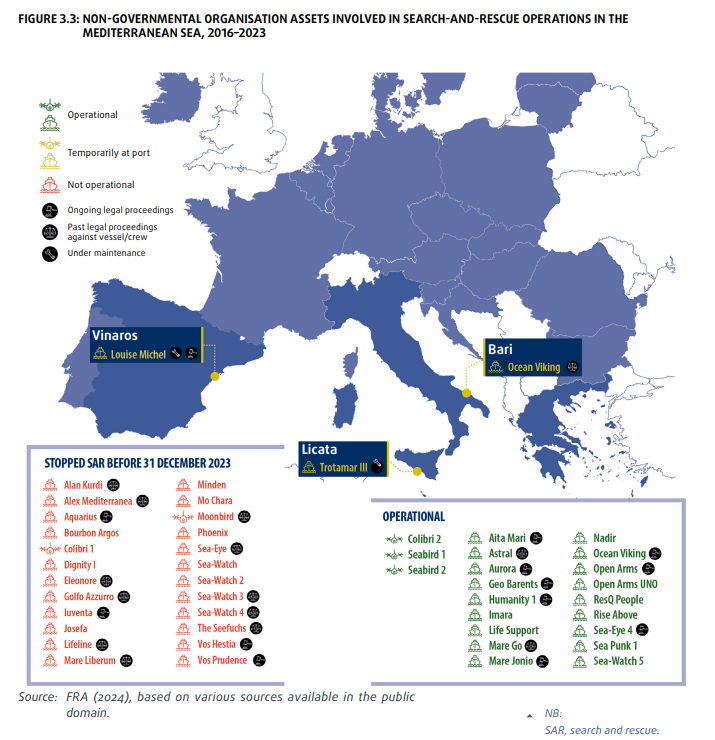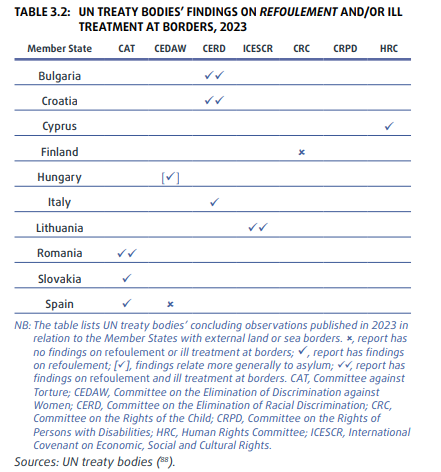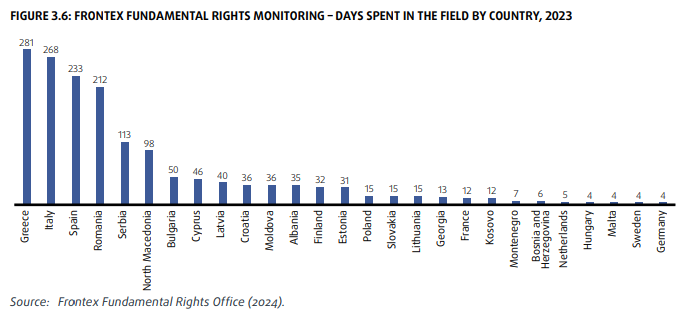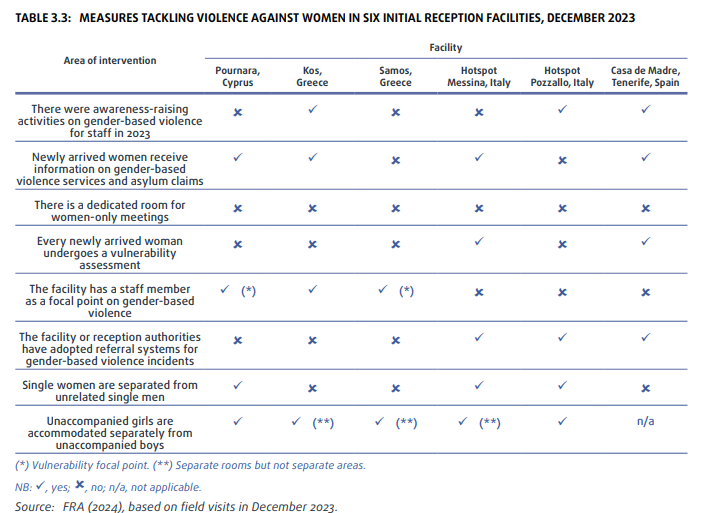FRA: Italy in Fundamental Rights Report 2024

Table of Contents
- Impact of the Cost-of-living crisis and rising poverty in the EU
- Addressing threats to Democracy and Civil Freedoms of Association, Peaceful Assembly and Expression
- Migration: Fundamental Rights Concerns at the EU’s External Borders
- Fundamental Rights Issues After Unauthorised Entry
- Implementation and Application of the EU Charter of Fundamental Rights
Impact of the Cost-of-living crisis and rising poverty in the EU
In 2023 Italy implemented legal measures to address rising energy prices, particularly for those most vulnerable to energy poverty. A key initiative was the introduction of a ‘social bonus’, a socially targeted energy tax credit aimed at easing the financial burden on low-income households. Rising inflation significantly impacted service providers assisting individuals facing homelessness and housing exclusion. In response, Italy introduced specific housing tax incentives. For instance, young people under 31 years old with an annual income below EUR 15000 were granted a tax deduction for the first four years of a new rental contract.
In 2023, Italy also adopted various legal and policy measures to combat homelessness. These included increasing the housing stock, protecting tenants from evictions, and offering support services for those at risk of losing their homes. While some EU Member States discontinued eviction bans implemented during the COVID-19 pandemic, Italy continued to face a significant housing crisis. In 2022 alone, 100000 enforced eviction requests were filed, with over 80% of new eviction rulings due to rent arrears. Furthermore, over 30,000 evictions were carried out without social support for the affected individuals. Italy also took measures to address food insecurity. The government allocated EUR 1.5 million in 2023 to provide direct food supplies through governmental services and charities. From 2024 onwards, this funding was increased to EUR 2 million to support the distribution of food parcels to people living in extreme poverty.
Addressing threats to Democracy and Civil Freedoms of Association, Peaceful Assembly and Expression
In 2023, freedom of peaceful assembly continued to face significant restrictions across several EU Member States. One major concern was the excessively restrictive legislation applied to public gatherings. The Italian government proposed criminalizing the obstruction of roads or railways when carried out by multiple individuals. CSOs also strongly opposed a law imposing prison sentences for illegal rave parties, arguing that its broad and vague wording made it disproportionate. Concerning climate protests in Italy, a Milan first-instance court ruled against placing a climate activist under surveillance, recognizing his peaceful intent. Legal action against journalists and civil society actors remained a pressing issue. In Italy, a journalist who had criticized the Prime Minister’s rhetoric, describing it as anti-immigrant, was charged with aggravated defamation - a move raising concerns over press freedom and government interference in independent journalism.
Migration: Fundamental Rights Concerns at the EU’s External Borders
In 2023, Italy and Albania concluded a protocol on migration management, under which Italy will establish two reception centres on Albanian territory. These centres will process asylum and return procedures for non-EU nationals rescued at sea.
The Report also mentions several ECtHR rulings found Italy in violation of fundamental rights:
- J.A. and Others v. Italy (No. 21329/18) – The court ruled that Italy violated Article 5 (unlawful detention), Article 3 (inhuman treatment due to poor detention conditions), and Article 4 of Protocol No. 4 (collective expulsion) in the case of Tunisian nationals detained in Lampedusa.
- Diakitè v. Italy (No. 44646/17) – Italy was found to have violated Article 8 (right to private and family life) by placing a minor in an adult reception centre, despite his birth certificate proving he was underage.
- A.B. v. Italy, A.S. v. Italy, and M.A. v. Italy (Nos. 13755/18, 20860/20, 13110/18) – The court found violations of Article 3 (prohibition of ill-treatment) and Article 5 (right to liberty) due to poor conditions and arbitrary detention in the Lampedusa hotspot.
- A.T. and Others v. Italy (No. 47287/17) – The court ruled that Italy violated Article 3, Article 5, and Article 13 (right to an effective remedy) concerning detention in the Taranto hotspot under inadequate conditions.
Concerning legal avenues for asylum seekers and refugees, resettlement remains the primary legal route, yet the 2 million people in need of resettlement in 2023 far outnumbered available opportunities. Despite limited alternatives, faith-based organizations in Italy have successfully facilitated humanitarian corridors since 2016. Between October 2022 and August 2023, 720 refugees (including Afghans, Eritreans, and Syrians, as well as women at risk of violence) arrived in Italy through these programs. Regarding refugees in labour migration schemes from 2023 to 2025, Italy has reserved 250 places per year for refugees in its immigration quota for labour migration. In addition, refugees may be admitted beyond the ordinary quota after they have been trained for 6 months in the countries of asylum. By the end of 2023, Italy was working on how to implement these provisions.
The number of people who died or went missing while attempting to reach Europe by sea increased by 37% in 2023 compared to 2022. The International Organization for Migration (IOM) recorded 4064 deaths and disappearances at Europe’s sea borders, including 191 children. On 26 February 2023 in the “Cutro shipwreck accident” in Italy 98 people died or went missing. Following the incident, Italy introduced a decree promoting legal migration and combating irregular migration.
While search-and-rescue operations fall outside EU law, they become relevant when linked to Frontex-coordinated missions or EU-funded border management efforts. However, civil society organizations carried out only 4.2% of sea rescues in Italy in early 2023, as new Italian regulations required vessels to immediately proceed to assigned ports after each rescue. The Sea-Eye 4 vessel was blocked and fined three times in 2023 for conducting multiple rescues before disembarking. Other vessels such as Ocean Viking, Louise Michel, Open Arms, and Humanity 1 faced similar restrictions. Five non-governmental organisations (NGOs) have complained to the European Commission over the new Italian law 15/2023. This law restricts search and rescue vessels from carrying out more than one rescue operation at a time which hinder human rights work.


Four national civil society organisations have expressed concern about coordinating search-and-rescue operations in its maritime search-and rescue zone, Malta has provided coordinates of people in distress at sea to armed groups operating in eastern Libya. These groups have then intercepted the boats and disembarked the rescued people in Libya, exposing them to gross human rights violations. Disembarkation data for 2023 following search-and-rescue operations in the central Mediterranean illustrate the limited number of people brought to Maltese ports 157651 people were rescued and disembarked in Italy.
In 2023, the Frontex fundamental rights conducted 46 monitors; 6 out of 10 monitors were women, which facilitated the monitoring of gender-specific aspects. Frontex spent 1627 monitoring days in the field from which 268 days were spent in Italy. The Frontex Fundamental Rights Office used the findings to propose mitigating measures; however, according to the Frontex Consultative Forum, Frontex has not sufficiently acted upon these proposals.

Concerning freedom of civil societies organisations FRA mentioned The European Commission’s 2023 rule of law report on Italy where specific difficulties are flagged for civil society actors defending migrants’ and refugees’ rights in Italy.
Fundamental Rights Issues After Unauthorised Entry
In 2023, Frontex recorded some 385000 irregular border crossings by land and sea. Sea arrivals increased significantly: in Italy, from some 105000 in 2022 to some 160000 in 2023. The EU’s revised asylum and return procedures will now require faster border processing for applicants from countries with an asylum recognition rate below 20% and simultaneous return decisions for rejected asylum claims. However, these rules do not cover outsourcing asylum processing to non-EU countries, such as the Italy-Albania protocol signed in November 2023. In September 2023, Lampedusa experienced an influx of 12000 arrivals within a week, overwhelming reception facilities. Italian authorities resolved the crisis through emergency transfers to Sicily.
Offering dignified reception at borders in 2023, some locations had to cater for many new arrivals. In Lampedusa, from 11 to 17 September, almost 12000 people arrived, overstretching the reception capacity of the whole island. Following a visit to Lampedusa, the President of the European Commission announced a 10-point plan to address arrivals by sea. The authorities in Lampedusa resolved the emergency through effective onwards movements to Sicily.
Addressing gender-based violence in initial reception facilities FRA collected information on measures to address and prevent gender-based violence in six initial reception centres. The two of the hotspots in Italy - the Messina and Pozzallo.

Implementation and Application of the EU Charter of Fundamental Rights
The Constitutional Court in Italy annulled a national provision on the ground that it violated Articles 7 (private and family life) and 20 (equality before the law) of the Charter. The provision did not grant equal treatment to Italian and EU citizens compared to non-EU citizens legally residing in Italy. The latter were subject to a European Arrest Warrant when Italy acted as an executing country.
Regarding the Charter and the use of EU funds by Italy, regions receiving and managing the European Regional Development Fund must identify a contact point. Its job is to ensure and strengthen compliance with the Charter, monitor activities and intervene in cases of noncompliance, examine any complaints and, where appropriate, involve the relevant bodies. It should also identify the most effective corrective measures. Additionally, the national coordinator of human rights teachers organised a cycle of training days in high schools in Tuscany. The aim was to promote a culture of fundamental rights and to raise awareness of the EU’s functioning and history.

